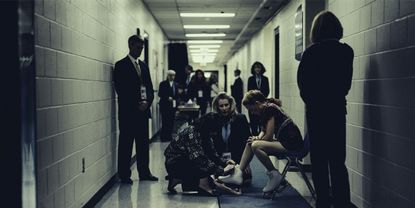The Toronto film festival concludes with raw truths and unexpected beauties
From I, Tonya to The Death of Stalin, here are the most noteworthy films of the latter half of the festival


Because major film festivals screen hundreds of movies each year, some are bound to have overlapping subjects ... in fact, sometimes that's even by design. I'd bet that as soon as the programmers at this year's Toronto International Film Festival booked Battle of the Sexes — a star-studded dramatization of the controversial, zeitgeist-defining 1973 exhibition tennis match between Billie Jean King and Bobby Riggs — they immediately went after Borg/McEnroe, a smaller-scale Swedish film about two very different Wimbledon champions.
Which film has the advantage? Call it square. Borg/McEnroe over-explains both the game of tennis and the different approaches taken by the intensely focused Bjorn Borg and the volatile John McEnroe. But Shia LaBoeuf does give a career-best performance as the brash American, channeling a lot of his own reputation as a talented brat into a take on McEnroe that's at once electrifying, scary, and sympathetic.
As for Battle of the Sexes (opening in theaters this Friday), it benefits from a spot-on Steve Carrell as consummate showman Riggs: a basically sweet man who played the part of the chauvinist pig to sell tickets to his showdown with King. And it has the always-enjoyable Emma Stone as the passionate feminist King, who was secretly exploring her sexuality while waging a high-profile fight for equality. But while Battle of the Sexes has a winning story to tell, the Simon Beaufoy script is a groaner, filled with dialogue about bra-burning women's libbers so clumsily on-the-nose that every line should begin with the characters saying, "It's 1973." The least cringe-inducing stretch of the movie is the final third — the match itself — which is largely scored to the sound of announcer Howard Cosell's original telecast.
Subscribe to The Week
Escape your echo chamber. Get the facts behind the news, plus analysis from multiple perspectives.

Sign up for The Week's Free Newsletters
From our morning news briefing to a weekly Good News Newsletter, get the best of The Week delivered directly to your inbox.
From our morning news briefing to a weekly Good News Newsletter, get the best of The Week delivered directly to your inbox.
Honestly, as sports biopics go, both Battle of the Sexes and Borg/McEnroe were kneecapped at TIFF by an underdog: I, Tonya, a look back at the turbulent youth of feisty figure skater Tonya Harding.
The film arrives saddled with three potential deductions. First off, the saga of Harding's rivalry with fellow skater Nancy Kerrigan has been pretty well picked over by tabloid reporters and documentarians, ever since "the incident" where Kerrigan was clobbered with a tire iron by an associate of Harding's husband Jeff Gillooly. Secondly, I, Tonya's director Craig Gillespie has a largely undistinguished filmography; and thirdly, screenwriter Steven Rogers employs a gimmicky structure, which has all the major characters telling conflicting versions of the story directly to the camera, like they're being interviewed in the present day.
But danged if all of this doesn't coalesce thrillingly. It helps that Gillespie has a terrific cast, including an Oscar-caliber Margot Robbie as the luckless, perpetually angry Harding, and Allison Janney as her chain-smoking, overbearing, physically abusive mother. As for the mockumentary shtick, it proves to be a boon, allowing the filmmakers to offer different perspectives on the same anecdotes, and to contrast their breezy storytelling with some moments of harsh reality, forcing audiences to reckon with how Harding was beaten, disrespected, and penned in by her background as a poor kid from Portland. This film is as frank as it is funny, and always keyed in to how the pursuit of Olympic glory is effectively closed off to some folks who don't have much money.
The heartbreaking horse-racing melodrama Lean on Pete is also Portland-based (at least in its first half), and is also about a youngster hampered by poverty and neglect. Charlie Plummer plays Charley Thompson, the son of a hard-living single dad. Left on his own after his father gets into trouble, Charley starts working for an irascible owner/trainer (played by Steve Buscemi) at a nearby racetrack, and develops an attachment to the title animal: a quarter-horse just one bad finish away from the glue factory.
Far from a rags-to-riches sports story, Lean on Pete is mostly a muted, clear-eyed study of life on the margins, following a smart, sensitive, hardworking high-schooler who's barely getting by. Writer-director Andrew Haigh (adapting Willy Vlautin's novel) previously made the arthouse hits Weekend and 45 Years, and co-created the HBO series Looking. He's a filmmaker who always seems to find the most vividly real spaces in which to shoot, which is maybe why he's unafraid to linger on silences — because the specificity of his locations and the depth of his characters allows the audience to understand what's happening on-screen even when there's no dialogue.
I don't want to give the idea that "realism" is the only ideal for movies to aspire to. TIFF's reputation as a major film festival was built on three at-times-competing aims: showcasing artful obscurities, providing a launching pad for prestigious Oscar bait, and presenting some of the wildest genre pictures from around the world.
So this year's fest didn't lack for outrageousness — whether it was legendary Hong Kong filmmaker John Woo returning to wild shootouts and chases in his wacky, self-parodic Man Hunt, or Japanese horror maestro Ryuhei Kitamura pitting a group of American college students against a ruthless sniper in the nerve-jangling Downrange, or Nicolas Cage chewing every last scrap of the scenery as a suburbanite infected with a disease that makes him want to murder his kids in Mom & Dad.
With most of the genre pieces at TIFF this year, the less realistic the movies were, the better. "Midnight Madness" offering Let the Corpses Tan is one that'll likely be talked about by cinephiles for years to come, even though co-directors Hélène Cattet and Bruno Forzani's adaptation of Jean-Patrick Manchette and Jean-Pierre Bastid's arty pulp novel is more an avant-garde deconstruction of spaghetti Westerns than an actual narrative film. And fans of director Guillermo del Toro will have a lot to look forward to later this year with The Shape of Water, which, like his classics Pan's Labyrinth and The Devil's Backbone, takes the imagery and unease of classic monster movies and coverts them into a politically engaged and poetic fairy tale — completely artificial, yet transporting.
Still, there's something to be said for capturing the complexities of the real world on the screen. Consider two provocative, controversial films at this year's TIFF: director Yorhos Lanthimos' The Killing of a Sacred Deer, about a doctor (played by Colin Farrell) whose fragile family dynamic is exposed when a strange teenager puts a death curse on his wife and kids; and writer-director-star Louis C.K.'s I Love You, Daddy, about an award-winning TV producer whose liberal attitudes are tested when his 17-year-old daughter falls into an intimate relationship with a Woody Allen-esque 68-year-old filmmaker.
Both movies aim to push the audience's buttons by confronting social taboos. The Killing of a Sacred Deer asks whether a father would be willing to sacrifice one of his children in order to return to his life of untroubled privilege, while I Love You, Daddy asks whether we can ever discern the "right" or "wrong" of a celebrity scandal without first-hand knowledge. But Lanthimos' film (co-written with Efthymis Filipou) is surreal and blackly comic, concerning characters whose ordinary behavior is stilted and eccentric; and Louis C.K.'s picture (co-written with Vernon Chatman) is at times almost painfully honest, filled with the kind of exploratory private conversations that friends and lovers generally try to keep to themselves and out of the media. In other words, I Love You, Daddy earns every squirm-inducing moment by talking through every side of its situation — and because Louis C.K. is a cinephile, the movie looks as good as Sacred Deer too, with rich black-and-white imagery meant both to honor and needle Allen's Manhattan.
To be fair, a lot of fest-goers (both in Toronto and earlier this year at Cannes) have loved The Killing of a Sacred Deer, which is undeniably fascinating and often funny, much like Lanthimos and Filipou's cult favorites Dogtooth and The Lobster. But at this particular point in history, a film that's at once as glib and as jarring as Sacred Deer feels like a waste of time and money.
Instead, I'll take The Death of Stalin, a satirical recreation of the bloody power grabs in the early 1950s Soviet Union, co-written and directed by Veep and The Thick of It creator Armando Iannucci. As with his TV work, Iannucci's new film frames high-stakes politics as the fumbling of small-minded incompetents, more interested in frat-boy pranks and petty revenge than in serving the people. The parallels to various contemporary administrations are undisguised. What makes the movie so powerful is that Iannucci is willing to sacrifice the occasional punch line, so that he doesn't undersell how ferocious the likes of Nikita Khrushchev (sharply played by Steve Buscemi) and Lavrentiy Beria (Simon Russell Beale) really were.
Similarly, writer-director Martin McDonagh's Grolsch People's Choice Award-winning Three Billboards Outside of Ebbing, Missouri is a slight departure for the man behind the wickedly funny and explosively violent films In Bruges and Seven Psychopaths. Though it's plenty witty, Three Billboards has more in common with the Tony-nominated playwright's work in the theater, which deals with ordinary folks in crisis. Here, the everyman is a woman, Mildred Hayes (played by the formidable Frances McDormand), who gets sick of waiting for the local police to find out who raped and murdered her daughter, and starts a publicity campaign to shame them. She's immediately vilified by a racist cop (Sam Rockwell), and by townsfolk who love the department's long-serving, cancer-ridden sheriff (Woody Harrelson).
Three Billboards Outside of Ebbing, Missouri has a lot to say about the abuse of authority and about how people of differing political persuasions live side-by-side in middle America. But what's most remarkable about the film — and why it stands a good chance to be an Oscar contender — is how stubbornly it defies audience expectations. The plot winds in surprising directions. The good guys sometimes behave abominably, while the villains prove worthy of redemption. The comedy often curdles, challenging viewers who might've otherwise been enjoying the movie just as a snappy portrait of colorful small-towners.
That's really what sets apart the great films above (and in my previous TIFF report) from the also-rans. The likes of Battle of the Sexes, Borg/McEnroe, and The Current War process the messiness of the real world into clean, comforting narratives, where everyone's motivations are clear, and the filmmakers' meanings are unmistakable. But Three Billboards, The Death of Stalin, I Love You, Daddy, I, Tonya, The Florida Project, and Mother! — while each incredibly entertaining in their own way — ultimately favor unease. That's why they'll endure, long after 2017's festival and awards seasons have come and gone.
Create an account with the same email registered to your subscription to unlock access.
Sign up for Today's Best Articles in your inbox
A free daily email with the biggest news stories of the day – and the best features from TheWeek.com
Noel Murray is a freelance writer, living in Arkansas with his wife and two kids. He was one of the co-founders of the late, lamented movie/culture website The Dissolve, and his articles about film, TV, music, and comics currently appear regularly in The A.V. Club, Rolling Stone, Vulture, The Los Angeles Times, and The New York Times.
-
 7 magnificent hotels to visit before the summer crowds descend
7 magnificent hotels to visit before the summer crowds descendThe Week Recommends Have beach time in the Dominican Republic or a spa day in Saint-Tropez
By Catherine Garcia, The Week US Published
-
 The Week contest: Sheep spray
The Week contest: Sheep sprayPuzzles and Quizzes
By The Week US Published
-
 The bird flu fight is faltering
The bird flu fight is falteringTalking Points Are pandemic lessons going unheeded?
By Joel Mathis, The Week US Published
-
 Walter Isaacson's 'Elon Musk' can 'scarcely contain its subject'
Walter Isaacson's 'Elon Musk' can 'scarcely contain its subject'The latest biography on the elusive tech mogul is causing a stir among critics
By Theara Coleman Published
-
 Welcome to the new TheWeek.com!
Welcome to the new TheWeek.com!The Explainer Please allow us to reintroduce ourselves
By Jeva Lange Published
-
 The Oscars finale was a heartless disaster
The Oscars finale was a heartless disasterThe Explainer A calculated attempt at emotional manipulation goes very wrong
By Jeva Lange Last updated
-
 Most awkward awards show ever?
Most awkward awards show ever?The Explainer The best, worst, and most shocking moments from a chaotic Golden Globes
By Brendan Morrow Published
-
 The possible silver lining to the Warner Bros. deal
The possible silver lining to the Warner Bros. dealThe Explainer Could what's terrible for theaters be good for creators?
By Jeva Lange Last updated
-
 Jeffrey Wright is the new 'narrator voice'
Jeffrey Wright is the new 'narrator voice'The Explainer Move over, Sam Elliott and Morgan Freeman
By Jeva Lange Published
-
 This week's literary events are the biggest award shows of 2020
This week's literary events are the biggest award shows of 2020feature So long, Oscar. Hello, Booker.
By Jeva Lange Published
-
 What She Dies Tomorrow can teach us about our unshakable obsession with mortality
What She Dies Tomorrow can teach us about our unshakable obsession with mortalityThe Explainer This film isn't about the pandemic. But it can help viewers confront their fears about death.
By Jeva Lange Published